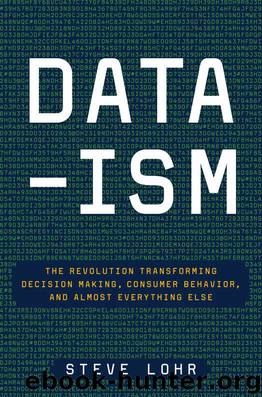Data-ism: The Revolution Transforming Decision Making, Consumer Behavior, and Almost Everything Else by Steve Lohr

Author:Steve Lohr
Language: eng
Format: mobi, epub
Publisher: HarperCollins
Published: 2015-03-09T14:00:00+00:00
What’s wrong with that? Let the machines do more and more of the work. The march of automation, after all, is a common theme in the economic history of the industrialized world. In the early 1940s, nearly 40 percent of the American workforce was employed in factories. Today, the manufacturing share of the labor force has declined to about 8 percent, even as the nation’s manufacturing output has increased sharply in value over the decades.
Yet even techno-optimists have second thoughts as they see smarter machines likely to take on cognitive tasks long reserved for humans—when what is being replaced is not sweat but synapses. In The Second Machine Age, Erik Brynjolfsson and Andrew McAfee of MIT make the case for a technology-led surge in productivity and growth in the future, but one that will have more sweeping and disruptive effects on society than previous waves of automation. The book, published in 2014, calls for adaptive changes in policy, education, and skills training to prevent more and more workers from being left behind. Their book also raises a central issue: As intelligent computers make more decisions, might humans lose control? To decide, after all, is to wield power.
So when do you hand the decision over to the machine-learning software? Context, once again, is crucial—namely, the setting in which a machine-made decision is being made. To explain, I think of a conversation with Claudia Perlich, the chief scientist of Dstillery, a data-science start-up in New York that specializes in ad targeting. Perlich is a former research scientist at IBM, a winner of prestigious data science contests, and a lecturer at New York University’s Stern School of Business. When I ask why she is using her skills to deliver ads, Perlich replies that digital marketing is a large, real-world testing ground where practitioners in a young field can safely learn valuable lessons. The online advertising marketplace, she says, is “a wonderful place for data scientists to experiment now. What happens if my algorithm is wrong? Someone sees the wrong ad. What’s the real harm? It’s not a false-positive diagnosis for breast cancer.”
In high-stakes decisions like diagnosing cancer, you unquestionably want a human in the loop. But systems like IBM’s Watson will increasingly plumb data, accumulate knowledge, and build models of the world—on their way to sometimes becoming superhuman decision makers. How do you really control them?
At a research conference at IBM’s Watson lab, Danny Hillis, an artificial intelligence expert and cofounder of Applied Minds, a technology design and research firm, took up that issue. The ever-smarter systems being made by IBM, Google, and others, Hillis says, will each need its own explanatory assistant—“a storyteller.” A computer system, no matter how clever, he said, will not get very far if it just spouts answers.
The machine, Hillis explains, must be able to “tell a story about why it did what it did. The key thing that will make it work and make it acceptable is storytelling.” What Hillis calls storytelling can be thought of as
Download
Data-ism: The Revolution Transforming Decision Making, Consumer Behavior, and Almost Everything Else by Steve Lohr.epub
This site does not store any files on its server. We only index and link to content provided by other sites. Please contact the content providers to delete copyright contents if any and email us, we'll remove relevant links or contents immediately.
Algorithms of the Intelligent Web by Haralambos Marmanis;Dmitry Babenko(17576)
Azure Data and AI Architect Handbook by Olivier Mertens & Breght Van Baelen(7682)
Building Statistical Models in Python by Huy Hoang Nguyen & Paul N Adams & Stuart J Miller(7671)
Serverless Machine Learning with Amazon Redshift ML by Debu Panda & Phil Bates & Bhanu Pittampally & Sumeet Joshi(7547)
Driving Data Quality with Data Contracts by Andrew Jones(7319)
Data Wrangling on AWS by Navnit Shukla | Sankar M | Sam Palani(7310)
Machine Learning Model Serving Patterns and Best Practices by Md Johirul Islam(7043)
Learning SQL by Alan Beaulieu(6274)
Weapons of Math Destruction by Cathy O'Neil(6260)
Big Data Analysis with Python by Ivan Marin(5959)
Data Engineering with dbt by Roberto Zagni(4948)
Solidity Programming Essentials by Ritesh Modi(4582)
Time Series Analysis with Python Cookbook by Tarek A. Atwan(4413)
Pandas Cookbook by Theodore Petrou(4100)
Blockchain Basics by Daniel Drescher(3571)
Natural Language Processing with Java Cookbook by Richard M. Reese(3160)
Hands-On Machine Learning for Algorithmic Trading by Stefan Jansen(3064)
Learn T-SQL Querying by Pam Lahoud & Pedro Lopes(2947)
Feature Store for Machine Learning by Jayanth Kumar M J(2937)
